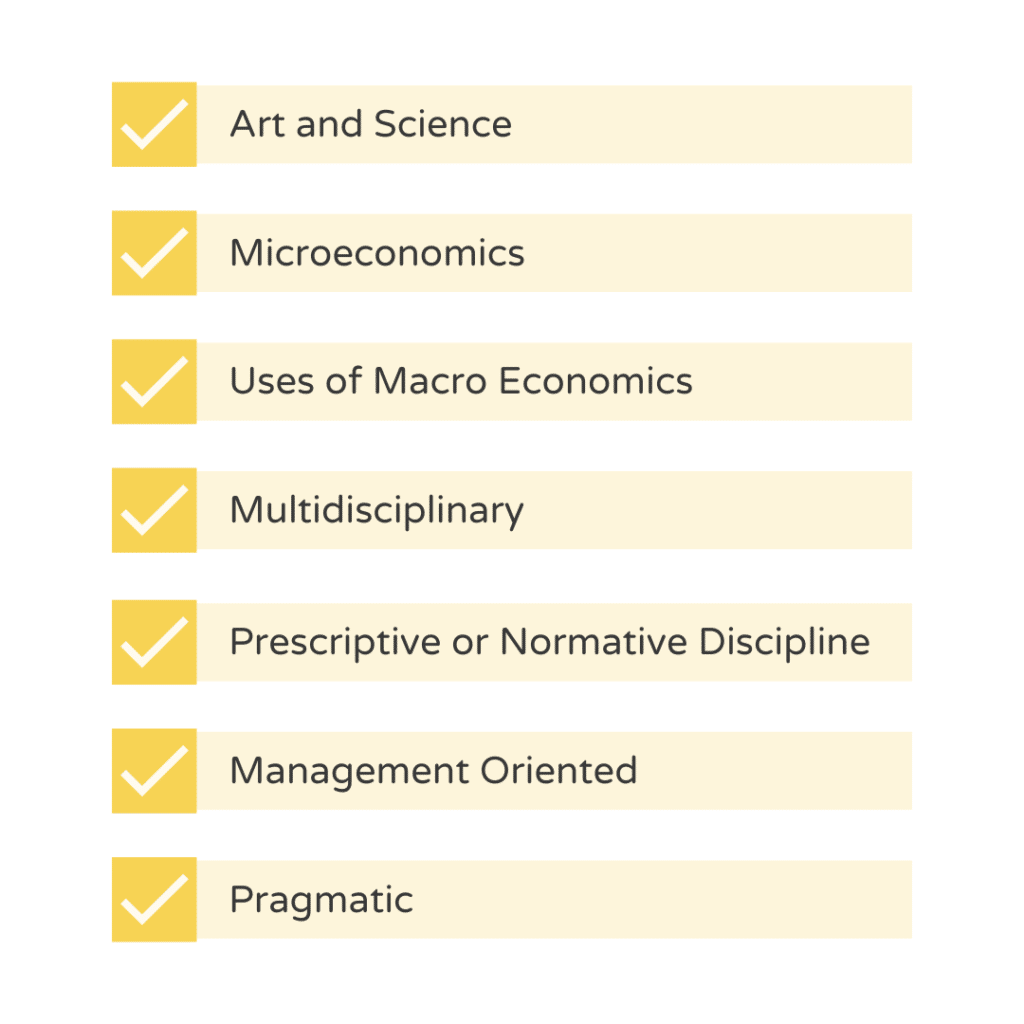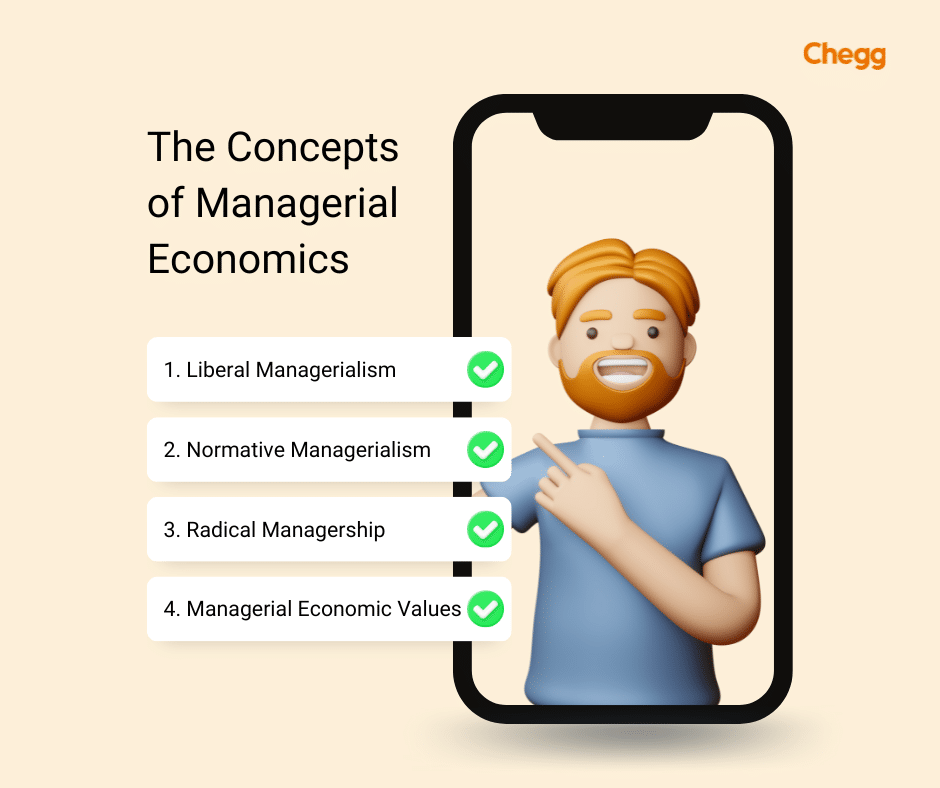
Got a question on this topic?

Quick Summary
Table of Contents

Authored by, Amay Mathur | Senior Editor




Amay Mathur is a business news reporter at Chegg.com. He previously worked for PCMag, Business Insider, The Messenger, and ZDNET as a reporter and copyeditor. His areas of coverage encompass tech, business, strategy, finance, and even space. He is a Columbia University graduate.
Businesses constantly make critical decisions, from investments and product launches to handling competition and shaping overall strategy. Managerial economics provides essential tools like demand analysis, cost assessment, pricing strategies, and risk evaluation to support informed decision-making.
Acting as a link between economic theory and real-world business applications, managerial economics enhances efficiency and profitability. It offers a structured approach to evaluating opportunities, prioritizing investments, and solving complex challenges using economic principles and quantitative methods.
Managerial economics covers demand analysis, forecasting, cost management, pricing, and strategic planning to optimize resources and drive growth. It applies across industries like manufacturing, technology, and services, helping businesses adapt to market changes and make data-driven decisions.
By evaluating risks and anticipating trends, it strengthens competitive advantage and ensures long-term success.
Managerial economics is a stream of management studies that focuses primarily on solving business problems and making decisions by applying the theories and principles of microeconomics and macroeconomics.
The meaning of managerial economics is very simple, as it is a specialized stream dealing with an organization’s internal issues using various economic tools. Economics is an indispensable part of any business. This single concept derives all the business assumptions, forecasting, and investments.
You need to know about the nature of managerial economics to gain more knowledge about it. Let’s read in detail about the nature and scope of managerial economics.

The concept of the nature of managerial economics includes the following:
Management theory requires a lot of critical and logical thinking and analytical skills to make decisions or solve problems. Many economists also find it a source of research, saying it includes applying different economic concepts, techniques, and methods to solve business problems.
Managers typically deal with problems relevant to a single entity rather than the economy as a whole. It is, therefore, considered an integral part of microeconomics.
A corporation works in an external world, i.e., serving the consumer, an important part of the economy. For this purpose, managers must evaluate the various macroeconomic factors, such as market dynamics, economic changes, government policies, etc., and their effect on the company.
Managerial economics uses many tools and principles that belong to different disciplines, such as accounting, finance, statistics, mathematics, production, operational research, human resources, marketing, etc.
By introducing corrective steps, managerial economics aims to achieve its objective and solves specific issues or problems.
This serves as an instrument for managers to deal effectively with business-related problems and uncertainties. This also allows for setting priorities, formulating policies, and making successful decisions.
The solution to day-to-day business challenges is realistic and rational. Different individuals take different views of the principles of managerial economics. Others may concentrate more on customer service and prioritize efficient production.
Recommended Read: Nature and Scope of Macroeconomics
As we discussed the nature of managerial economics above, now we will discuss the scope of economics in detail. Both microeconomics and macroeconomics have an equal effect on the organization.
As we know, the scope of microeconomics is huge. The various theories or principles of microeconomics used to solve the internal problems of the organization arising in the course of business operations are as follows:
Any organization is greatly affected by the environment in which it operates. The business climate can be defined as follows:
The branch of managerial economics comprises various concepts:

A market is a democratic space where people make their choices and decisions. The organization and its managers must function according to the customers’ demands and market trends; otherwise, this can lead to business failures.
Managerial economics’ normative view states that administrative decisions are based on experiences and practices of real life. They systematically study demand, forecasting, cost control, product design and promotion, recruitment, etc.
Managers have to have a creative approach to business concerns, i.e., make decisions to improve the current situation or circumstance. We concentrate more on the needs and satisfaction of the consumer rather than just the maximization of income.
The excellent macroeconomist N. Gregory Mankiw has given ten principles to explain the significance of managerial economics in business operations.
Managerial economics follows several principles. These principles help in assessing its application in diverse areas. Both conceptual and metrical aspects are dealt with in this field. Problems often arise due to a disequilibrium in the economic theory and managerial theory of business organizations. Various analytical tools enable firms to identify the nature and measure of problems.
The principles of managerial economics are as follows:
Let us go through the following principles to understand how decision-making takes place in real life:
Communication and the market impact business transactions. Let us take a look at the following related principles to justify the statement:
The following theory outlines the economic role of an organization’s functioning:
Management economics is an important method for assessing the company’s priorities and objectives, the organization’s current role, and what the management can do to fill the void between the two.
Deriving from the definition of managerial economics, we have listed the best options you can pursue in this field.
Banking sector job profiles are financial analysts, consultants, financial advisers, investment bankers, environmental policymakers, development officers, or part of Research and Development. The job in banking sector comes on top when we think about the scope of managerial economics.what is managerial economics
They deal with various sectors and companies, and their main role is to serve as an intermediary between the corporate world and the outside world.
There are several programs and courses to procure a degree in managerial economics. You can acquire in-depth knowledge in this field by doing higher studies in this subject. Many renowned institutions offer such programs along with good placements. Having high-level knowledge can fetch you impeccable opportunities.
They analyze the company’s financial details and calculate the associated default risk to help the lender and the buyer.
A financial controller, or economist, is concerned with analyzing the day-to-day financial operations of an organization. He/she supervises the finance and accounting department and prepares financial reports.
A market analyst analyses the market so that their employers can make better decisions concerning product launches or rendering services.
From output to the review of statistics to educating new staff, an operations manager manages all day-to-day activities in the company and needs to ensure that the organization runs optimally.
If you want to be a lecturer or become a senior economics teacher in private schools, apply for the NET / CTET exam in the field of education. After completing an M.A. in Economics with a mark of at least 55 percent, an applicant can either seek a Ph.D. at any college or appear for UGC-NET. The exam is administered by the NTA.

An equity analyst extracts equity information for investment purposes and explores stock market insights to identify where to invest or whether to proceed or sell on the market.
A Cost Accountant plans, studies, and records the costing concepts of an organization. He/she analyzes the fixed and variable costs to obtain the company’s total cost. A cost accountant is one of the exciting career options under the scope of managerial economics.
You can join The Economic Services of India. To join this service, you have to appear for the Indian Economic Service Exam. You should have completed a M.Sc. or MA. in economics with at least 55 percent marks. The age range is 21-30 years. UPSC administers the test.
The Reserve Bank of India also recruits banking-sector economists through various recruitment exams. The age limit is 21-28 years.
An Economics degree holder can apply to both private and foreign banks. The Banking job categories are branch managers, clerks, economic analysts, planning and development officers, etc.
Agricultural Economics is an advanced branch of Economics. An agricultural economist optimizes the production, distribution, and consumption of food and fiber products.
Experienced and professional economists in well-known international organizations such as the World Bank and the International Labor Organization (ILO) can get great employment opportunities.
Graduates in Economics can work as economic consultants independently. In the case of various scientific research and consulting in the private sector, companies can ensure optimal job opportunities. The position includes Economic Researcher, Business Economist, Investment Analyst, etc.
Economists possessing a profound understanding of the market can create their own start-ups. They can evaluate the industry dynamics and competitive business sectors and, thereon, design their business processes. Ultimately, they can achieve exponential growth by starting their own business. Besides, it will also aid the unemployment problems in the country by generating work opportunities.
You can also join the news media by becoming an economic or editorial journalist. You can complete your graduation or post-graduation in mass communication and head towards joining mass media. Even if your educational discipline is different, you can take advantage of this option. By having the required knowledge and skills relating to this field, you can grow in your career exceptionally.
Also, Read: Career Options in Economics
Managerial economics holds great importance in various management processes. The main importance of managerial economics in an organization is Demand Analysis & Forecasting, Profit management, and Capital Management. It assists an organization in its decision-making process by integrating the tools and techniques of economic theories with multiple business activities.
Managerial economics deals with the optimum utilization of scarce resources. It ensures the proper functioning of the firm by using the resources effectively. It guides the management in rational decision-making, implementing both economic theories and econometrics. With the help of factual data solutions, several economic problems are curated.
Learn with Chegg and get expert help for your studies online. Chegg is a globally recognized educational provider. It is highly acknowledged by students across the world.
Students worldwide trust Chegg for helping them with their studies. You can simplify your complex topics with the help of experts at Chegg. Chegg comprises an efficient team of Subject-Matter Experts (SMEs) who assist in clearing your concepts. They break down complex topics into simple terms and create easy explanations with the help of definitions, videos, illustrations, and many more.
Are you interested in the subject of Economics? Do you want to learn more about it? Our experts will help you out. Get wide exposure to the world of economics and clarify various concepts from your home. All you need to do is sign up.
The three types of managerial economics are:
1. Liberal Managerialism
2. Normative Management
3. Radical Managerialism
Managerial economics applies economic theory and quantitative methods to business management. It aids in decision-making by analyzing market trends, optimizing resource use, and forecasting financial outcomes, ultimately helping firms achieve their objectives efficiently.
Managerial economics is a stream of management studies that focuses primarily on solving business problems, and making decisions by applying the theories and principles of microeconomics and macroeconomics.
Managerial economics is a stream of management studies that focuses primarily on solving business problems and making decisions by applying the theories and principles of microeconomics and macroeconomics.
Adam Smith is widely regarded as the “father of economics.” His seminal work, “The Wealth of Nations” (1776), laid the foundations for classical economics and introduced key concepts like the invisible hand and free markets.
Editor's Recommendations
Chegg India does not ask for money to offer any opportunity with the company. We request you to be vigilant before sharing your personal and financial information with any third party. Beware of fraudulent activities claiming affiliation with our company and promising monetary rewards or benefits. Chegg India shall not be responsible for any losses resulting from such activities.
Chegg India does not ask for money to offer any opportunity with the company. We request you to be vigilant before sharing your personal and financial information with any third party. Beware of fraudulent activities claiming affiliation with our company and promising monetary rewards or benefits. Chegg India shall not be responsible for any losses resulting from such activities.